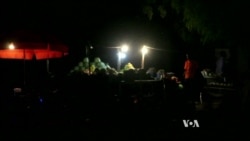The only thing reliable about Nigeria’s power supply is its unreliability.
From the megacity of Lagos to the capital of Abuja to state capitals like Yola in northeastern Adamawa state, the lights are frequently off.
Families and businesses that can afford them rely on generators. The rest of Nigeria's residents make do with open-air flames for light and cooking.
Idriss Ibubi, a shopkeeper, said he pays for electricity but gets it for only a small fraction of the day.
“After you pay, there is no light," he said. Power is available for three to five hours a day, sometimes longer, he said. "Like now in my area, they normally bring light, midnight till maybe 6 in the morning. Highest is seven [hours]. Then you spend the rest of the day without light. If you’re a businessman, you must own a generator.”
Nigeria began privatizing its power sector in 2010, handing over state-owned distribution and generation companies to investors in an effort to improve power supply and transmission.
The Yola Electricity Distribution Co. serves between 180,000 to 200,000 people in the country’s northeast. But company spokesman Aliyu Hassan Ardo said the company often does not get the 3.5 percent of available capacity promised to it — hence, the blackouts.
“We have been battling with little allocation, low allocation of electricity because of the low allocation, and also lack of giving us the right megawatt of electricity," Ardo said.
Nigeria’s power generation lags behind the demands of its own economy, which is Africa’s largest. The sounds of generators are ubiquitous.
Nigeria-based surveyor NOI Polls reported that in 2013, 81 percent of Nigerians used alternative sources for electricity other than the national grid.
Idayat Hassan, director of the Center for Democracy and Development in Abuja, said rundown power plants have continued to hold back the energy sector, which is vital for job creation.
“We have infrastructural deficit," Hassan said. "There is a culture of maintenance rather than building. So when you have all these old, decrepit power plants ... and not many are being built, what they are trying to do is maintain them. The reality is obvious.”
That reality, for many in Nigeria, is simple: No power, no money.





